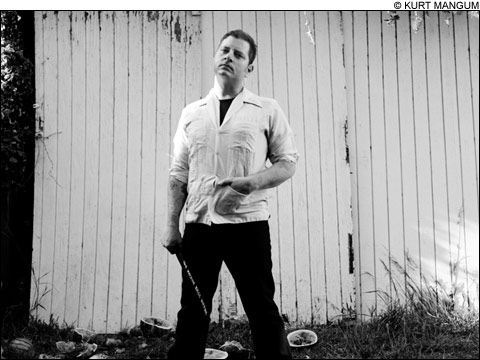
FEAR AND LOATHING: Like a more famous alienated road-tripper, Mattson matches excess with the appeal of raw eccentricity. |
| Empty the Sun | By Joseph Mattson | 176 Pages | Barnacle Books | $18 |
Joseph Mattson's second Los Angeles–spawned novel is at least up front about where it's headed: "Here I was, doing ninety on the Santa Monica Freeway with a quart of whiskey shoved into my crotch and my dead neighbor in the trunk." Yes, a road novel about an addiction-addled blues guitarist fleeing LA in an, at times, hallucinogenic haze of reflection and inner conflict. Cue the ennui, excess, and disillusionment — and potentially overwrought cliché. What's more, the book is accompanied by a soundtrack by prolific new-folkers Six Organs of Admittance — the kind of hip multimedia move that ups the groan potential.
And yet, Empty the Sun balances its verbal and narrative excesses with emotional substance and a convincing variation on the theme of loss. Despite an opening scene that will instill fear and loathing in any reader who recognizes the all-too-familiar trope of the drug-induced America-highway saga, things improve quickly, and Mattson makes it clear that this is not just a Thompsonian exercise in self-medicated wild-man alienation.
The unnamed first-person narrator reveals that, the previous night, he was visited in a dream by God, who tells him to shoot himself — because the world will be ending in six days, on July 4. Upon waking, our sadsack of a hero walks down the hall of his dingy motel-room home to relate the hellfire and brimstone to his wise old junkie neighbor. Hal, however, is dead — not of the expected overdose, but of apparently natural causes. In his rigor-mortised hand, he holds an unfinished letter to his long-left-behind true love, Maggie.
This sets the narrator off on aimless road tripping. Eventually, after miles of indecision, he decides he must deliver the letter. Through a series of well-placed flashbacks, we discover that he was once a guitarist of considerable skill, living in artistic squalor before losing the index finger on his fret hand and becoming a joyless mess of self-pity. And he wastes no opportunity to point out that he once played guitar — his former musicianship is a constant reference point for anything that ever meant something to him. This guitar-as-extension-of-self grows tiresome after about the fourth mention. Yet every so often, it arrives with substantial grace: "They cuffed me and threw me into the back of the van along with my guitar, a Guild M20 mahogany solid-top, my baby so to speak, that guitar and I had damaged each other into the perfect harmony."
Mattson's florid descriptions are an equally mixed bag, by turns masturbatory nonsense (LA is "the pimp mime of smiling daggers and winsome decay") or spot-on ("The air tasted of the tangy metallic emptiness of departure"). For better and worse, it's the raw eccentricity of his prose and storytelling that holds you for the ride, even as the wordy oblivion draws closer and closer.
By comparison, the novel's sonic companion is gloriously understated. Six Organs of Admittance, the solo moniker for guitarist Ben Chasny, capture both the slow, constricting heat and the wind-blown vastness of the novel. With Steve Ruecker on pedal steel and percussion, Chasny weaves churning, largely instrumental, stoned-in-the-sun blues ballads emblematic of Mattson's tale.